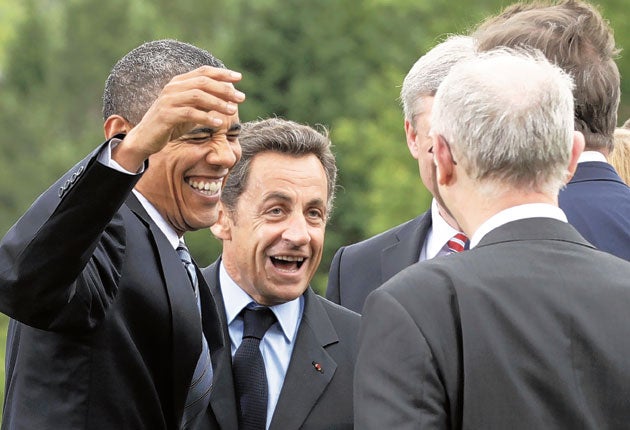Fresh from taming Wall Street, Obama takes on the world
President challenges global leaders to rethink austerity plans

Emboldened by an overnight accord on Capitol Hill to enact the most sweeping rewriting of the rules of Wall Street since the Great Depression, Barack Obama rode into summits with fellow world leaders in Canada, ready to read them the riot act on protecting the fragile global recovery.
The US President urged countries to carry on stimulating the economy and not focus solely on deficit-cutting measures like those announced by Britain. His approach threatened to expose deep fault lines at last night's G8 meeting north of Toronto and at the G20 that begins in the city tonight.
Mr Obama's hand was clearly strengthened, however, when at the break of dawn yesterday negotiators in Congress announced they had finalised draft legislation to redefine how Wall Street works. The new law, triggered by the financial implosion of 2007-2009 that brought America's financial edifice close to collapse, should be formally approved and sent to the White House for the President to sign next week. "This crisis proved and events continue to affirm that our national economies are inextricably linked and just as economic turmoil in one place can quickly spread to another, safeguards in each of our nations can help protect all nations," Mr Obama said after the deal was struck.
Europe and the US agreed last year to take concerted action to foster recovery. Germany and France in particular emphasised increased regulation of the financial sector. The US will say it is now delivering that side of the bargain. But in a letter to European leaders Mr Obama suggested that they have shifted too fast to deficit-reduction measures, thus endangering growth promotion.
But over a working lunch yesterday, David Cameron stressed the importance of the deficit reduction plan that George Osborne announced in the Budget on Tuesday. The Prime Minister told his first G8 summit that a recovery in the global economy was important but insisted: "The UK carries a big fiscal deficit. That path to recovery requires us to deal decisively with the deficit problem."
In a round of television interviews as the summit kicked off in the resort of Deerhurst, Mr Cameron attempted to play down suggestions of a rift with the US, insisting that there was "no difference" between him and Mr Obama on the need to deal with imbalances threatening the world economy. And he stressed that the US President recognised that each country must take steps appropriate to its national circumstances. Countries with healthy budget surpluses, like China, could stimulate growth by boosting domestic demand, but those with large debts need to restore confidence by "living within their means", said Mr Cameron.
"What I want to achieve above all is to get the right outcome for the world economy and that means those countries, like our own, with big budget deficits have to move faster. Other countries, with surpluses, can afford to do different things."
While Mr Cameron is to hold bilateral talks tonight with Mr Obama, other European leaders seemed to hesitate before committing to seeing the US leader for one-to-one meetings, further suggesting a new frostiness between them and Washington.
The Canadian Finance Minister, Jim Flaherty, seemed to sense the danger, saying publicly that it was unrealistic for countries to follow a single template for recovery. "One size doesn't fit all," he told reporters.
But Angela Merkel, the German Chancellor, was clearly stung by criticism that her government has promoted exports at the expense of stimulating domestic growth. "German export successes reflect the high competitiveness and innovation strength of our companies" she told the Wall Street Journal yesterday. "Artificially reducing Germany's competitiveness would be of no use to anyone."
In a further threat to unity, countries whose banking sectors performed relatively well in the crisis, including Canada and Japan, are reluctant to embrace the financial reforms that the US is now taking. Another area of difficulty is China's exchange rate policy. There is growing scepticism as to whether steps taken by Beijing ostensibly to loosen controls on its currency and allow it float upwards against the dollar and the Euro will in fact deliver any such thing.
After weeks of battering by the bad news from the BP oil spill in the Gulf and stubborn unemployment numbers, Mr Obama will be buoyed by the passage of the financial reforms, his second big legislative success on Capitol Hill after the healthcare reform laws. Despite some dilution the new reforms are stronger than expected. In the final hours of a 21-hour negotiating session, lawmakers introduced measures to place an "assessment fee" on large Wall Street banks to help pay the $19bn cost of the new regime. This is largely in line with the bank tax introduced this week in Britain and similar taxes promised by France and Germany.
Key provisions in the sweeping new law include new rules to curb shady practices in the mortgage and credit-card industry, strict limits on banks using deposits to trade on their own accounts, and new strictures on the trading of obscure financial instruments like derivatives and debt, which contributed so significantly to the recent crash. Nothing in the new rules is likely to seriously threaten the capitalist ethos of Wall Street. But with public anger still running high, they will put pressure on the banks to behave more responsibly.
Subscribe to Independent Premium to bookmark this article
Want to bookmark your favourite articles and stories to read or reference later? Start your Independent Premium subscription today.

Join our commenting forum
Join thought-provoking conversations, follow other Independent readers and see their replies